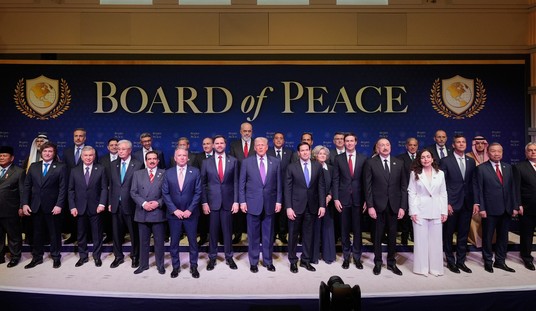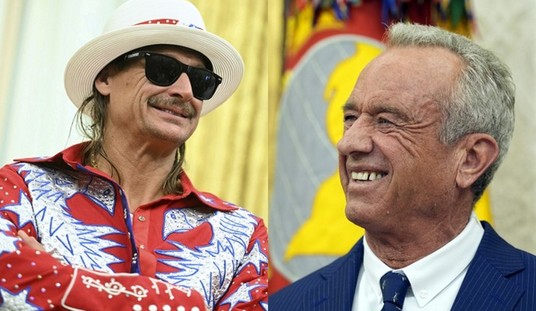The value of intact families has been vigorously debated for the past few years, always in the muted tones appropriate to social-issues discussions the Left doesn’t like. There is little question that broken families and illegitimacy are enormous handicaps for children; controlling for illegitimacy greatly reduces every other demographic factor in crime and poverty. The upper class in America tends to marry young, have children, and stay together until the kids depart to raise families of their own; the lower and middle classes do it the other way around, with marriage revealed in polls as an end-of-life career capstone in the minds of many young people.
Correlation is not causality, so we might hypothesize that the traditional model of marriage is something the upper classes can afford to indulge, not a primary factor in their prosperity; conversely, poverty and other social factors lead to less interest in family formation, rather than reduced importance for marriage leading to poverty. Simple answers are not found easily when studying the choices and fortunes of millions of people.
And unfortunately, our culture has been molded to make frank discussion of such social issues nearly impossible, because every good word put in for the traditional family is taken as an insult to those who choose “alternative lifestyles.” That is both unwise and unreasonable; it should be possible to praise marriage without holding a shred of contempt or animosity for those who don’t participate in it. But that’s not how social discourse works anymore. Everything is either the best or the worst. To raise some on a pedestal, others must be shoved in a ditch. Those who would deconstruct the family are the ones who seem insistent on black-and-white zero-sum models of Right and Wrong, setting rules of engagement in which one must be careful not to make value judgments that offend the ruling orthodoxy.
The biggest counter-cultural radical in America today is someone who observes that it’s tough to raise the 2.5 children required for population stability without a young man and young woman setting themselves to the task before they turn 30. It’s very difficult for a society to endure unless a lot of young men and young women follow that path. Not all of them, of course, but a lot. If those statements are true, then how does society benefit by making people nervous about saying it out loud? Especially since we have accepted the concept of activist government that uses subsidies and mandates to nourish far less potent benefits for society?
We might think about the issue by listing the tangible benefits that accrue to the married couple and their children, beginning with the obvious truth that raising kids is hard enough work for two, let alone one. Managing the expenses of a household is easier for two. An intact family can offer valuable connections to grown children as they set forth in the world. And families accumulate wealth across generations, even when beginning from modest means. In a world where everyone slips rapidly into debt, family assets are a huge advantage.
Many bullet points could be added to that list, but there’s another, less tangible asset the good old family model brings to the table: family honor.
It seems quaint these days, or at least something only emphasized in mob movies, but of course the Mafia didn’t invent the concept. The notion that a family has honor, which all of its members are responsible for upholding, is a powerful concept. People conduct themselves very differently when they think of themselves as part of a family legacy that reaches across generations. Appealing to personal dignity and integrity is one thing (and perfectly valid in its own right) but it’s interesting to note the reaction of even fairly young children when they are told unacceptable conduct makes Mom or Dad look bad, or encourage to do their best because their parents will be proud.
Family honor has not completely vanished from American society, but it’s not as important, or openly stressed, as it used to be. That’s partly a result of enduring generations of government policy designed to pull families apart. Virtually every item on the Left’s agenda is designed to move people away from their families and bring them closer to the State. Everything on the menu is meant to make marriage and traditional child-rearing less necessary, under the rubric of enhancing personal freedom. Take your pick of liberal social crusades – from activist public education in which parental involvement is explicitly undervalued or unwelcome, to the bloody-minded (if you’ll pardon the expression) determination to ensure that casual sex has absolutely no consequences, to the cultural and political drive to sexualize increasingly young children – and you can easily make it fit into the War On Family. The hardcore Left understands that family relationships take up valuable social real estate the State wishes to occupy; independence begins where government dependency ends. The more mainstream liberal just wants to make family relationships less important, more of an option, one choice of no special value among many.
Noodling away at this project for decades has allowed the Left to offer ridiculous garbage like the new effort to spin ObamaCare job losses as a positive benefit to society, because taxpayer loot will now enable more people to walk away from their jobs and seek personal fulfillment. An earlier generation of Americans would have laughed this off the national stage, probably hard enough to blow away the Party that offered it. They would have been insulted by the attempt to portray jobs as a burden the government should liberate us from.
One reason for that more independent and dignified attitude was the conviction that people should be responsible for taking care of their own families, not looting other people with the aid of high-powered politicians and regulatory agencies to obtain their sustenance. Certainly people did not want to think of themselves as hapless victims who needed government welfare to secure food and medicine. But perhaps more importantly, they didn’t want their families viewed that way. Even hard-scrabble families held to the ideal of seeking opportunity and working to lift themselves up, rather than hoping some compassionate bureaucrat would adopt them like pets.
Imagine the reaction of previous generations to the Democrats’ insulting “job lock” spin. Nervous laughter would have quickly given way to public fury. “How dare you assume my family, or anyone within it, finds the demands of earning a living too much to handle? What do you take us for, bums? You lefties give a lot of speeches where you prattle on about creating jobs and giving people the dignity of work, but now you’re saying me and my family aren’t fit to handle such challenges.”
But we have reached a moment when many people don’t think of their families that way. If matters of dignity and respect are discussed at all, they are entirely personal affairs… and personal dignity is more easily traded away for benefits and entitlement payments. The old local network of proud families protecting reputations built over decades has been replaced by a cold national network, in which we are all bits of faceless data. The independence secured by family members supporting each other across lifetimes has grown scarce in too many communities. And where independence recedes, the tide of power rushes in.
These days, only big-ticket politicians talk about the importance of their “dynasties.” Maybe 2016 will see a clash between the Clinton dynasty and the Bush dynasty – wouldn’t that be exciting? But you are party of a dynasty, too. Your family has a grand story to tell. You carry its banner forward through history. What you build, your family surveys. What you achieve becomes its legacy. And what you do reflects upon its honor. That’s an even higher standard of accountability to hold than personal integrity, even when you hold it mostly in your heart, thinking of your parents, brothers, sisters… and their dreams for you… when you make important decisions in life. If our political class thought it faced a nation full of people who viewed themselves in that light, they would speak to us differently.













Join the conversation as a VIP Member